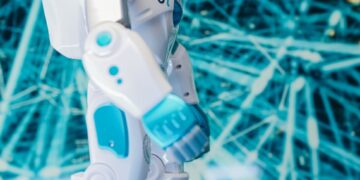The landscape of global industry is undergoing a profound and unprecedented transformation, driven by the relentless, pervasive integration of artificial intelligence. No longer a concept confined to science fiction or specialized tech labs, AI has permeated every facet of business operations, from supply chain optimization and customer service to product development and strategic decision-making. This rapid ascent of intelligent automation, predictive analytics, and machine learning capabilities is fundamentally reshaping how industries function, compelling leaders and professionals alike to confront a critical reality: the very foundations of established skills and conventional strategies are being redefined. To thrive, or even merely survive, in this new era demands a complete, urgent re-evaluation of what it means to be competitive, innovative, and relevant.
The seismic shift in operational paradigms
AI’s integration isn’t just an incremental improvement; it represents a fundamental re-architecture of operational paradigms across diverse sectors. In manufacturing, AI-powered robotics and predictive maintenance systems are not only enhancing precision and speed but also anticipating equipment failures before they occur, drastically reducing downtime and optimizing production cycles. The financial sector is leveraging AI for sophisticated fraud detection, algorithmic trading, and personalized wealth management, moving beyond rule-based systems to dynamic, learning models that adapt to real-time market fluctuations. Healthcare sees AI assisting in everything from diagnostics through image analysis to personalized treatment plans and drug discovery, accelerating processes that once took years into months or even weeks. This deep integration means AI is no longer a peripheral tool but an intrinsic component of core business functions, driving efficiencies, unlocking new capabilities, and creating entirely new value propositions that were previously unimaginable. The shift is from reactive to proactive, from manual to automated, and from statistical to predictive.
Workforce metamorphosis: evolving roles and essential skills
As AI assumes routine, repetitive, and data-intensive tasks, the nature of human work is undergoing a significant metamorphosis. While concerns about job displacement are valid, the more nuanced reality is one of role evolution and the emergence of entirely new professions. The demand for “AI trainers,” “prompt engineers,” “data ethicists,” and “AI integration specialists” highlights this shift. For the broader workforce, success in an AI-powered world hinges on cultivating skills that complement, rather than compete with, artificial intelligence. This includes a heightened emphasis on critical thinking, complex problem-solving, and creativity – abilities where human cognition still holds a distinct advantage. Furthermore, data literacy, the capacity to understand, interpret, and communicate insights derived from AI-processed data, becomes paramount. Emotional intelligence, collaboration, and adaptability also gain importance as human teams increasingly interact with AI systems, requiring nuanced communication and the ability to navigate change. Lifelong learning is no longer a professional aspiration but a foundational necessity, with continuous upskilling and reskilling programs becoming vital for individuals and organizations alike.
Strategic imperative: recalibrating for an AI-driven future
For businesses, AI’s pervasive integration necessitates a complete strategic recalibration. Organizations must move beyond pilot projects to embedding AI deeply into their core business strategies and investment priorities. This involves significant investment in robust AI infrastructure, secure data governance frameworks, and developing a culture that embraces experimentation and rapid iteration. Furthermore, companies are compelled to rethink their entire value chains, identifying how AI can optimize everything from research and development to marketing, sales, and post-purchase customer support. Customer experience, in particular, is being revolutionized by AI-driven personalization and predictive analytics, allowing businesses to anticipate needs and deliver tailored interactions at scale. Strategic partnerships with AI solution providers and talent acquisition focused on AI expertise become critical competitive differentiators. The table below illustrates the projected growth of the AI market, underscoring the immense strategic opportunity for businesses that effectively integrate AI:
| Year | Global AI market size (USD Billion) | Projected Growth Driver |
|---|---|---|
| 2022 | ~100 | Initial enterprise adoption, AI-powered software |
| 2025 | ~300 | Broader industry integration, specialized AI solutions |
| 2030 | >1,000 | Pervasive AI across all sectors, advanced generative AI |
Source: Statista projections (approximate values)
Navigating the ethical labyrinth of AI integration
As AI becomes more integrated and powerful, the ethical implications become increasingly central to successful and responsible adoption. Issues such as algorithmic bias, data privacy, transparency in decision-making, and accountability for AI-driven outcomes are not merely compliance headaches but fundamental challenges that can erode public trust and stakeholder confidence. Businesses must develop robust ethical AI frameworks, ensuring that their AI systems are fair, explainable, and respect user privacy. This involves proactive measures to identify and mitigate biases in training data, establish clear guidelines for AI’s use, and implement mechanisms for human oversight and intervention. Governments and regulatory bodies are also grappling with how to effectively govern AI, seeking to strike a balance between fostering innovation and protecting individual and societal rights. Ultimately, navigating this ethical labyrinth is not just about avoiding pitfalls; it’s about building a foundation of trust that is essential for the long-term, sustainable integration of AI into every aspect of our lives and economies.
In conclusion, the pervasive integration of artificial intelligence is no longer a future prospect but a present reality fundamentally reshaping every industry. From optimizing operational efficiencies and revolutionizing business models to transforming the very nature of work, AI is an undeniable force. This seismic shift demands an urgent, comprehensive re-evaluation of both individual skill sets and organizational strategies. Success in this AI-driven era hinges on continuous learning, fostering human-centric skills that complement AI capabilities, and strategically embedding AI into core business functions while prioritizing ethical considerations. Organizations that embrace this transformation with agility, foresight, and a commitment to responsible innovation will not only survive but thrive, unlocking unprecedented opportunities for growth and value creation. Conversely, those that fail to adapt risk being left behind in an increasingly intelligent and automated world.



















